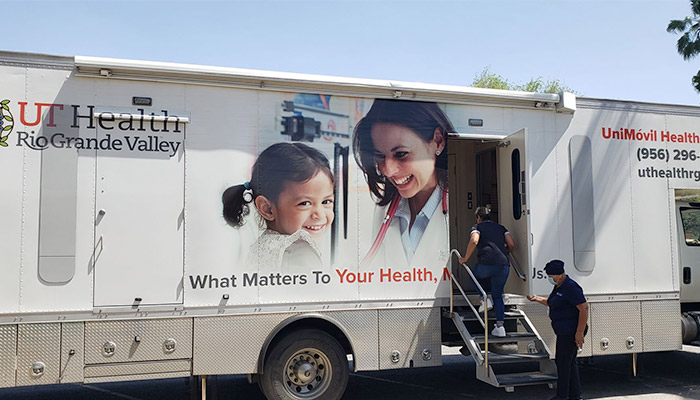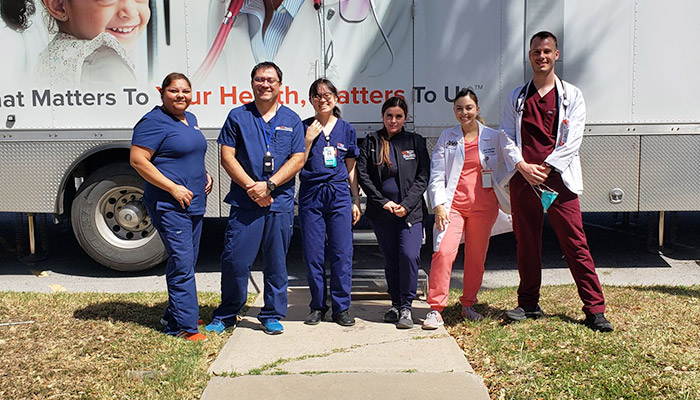Healthy Mujeres in the Texas Rio Grande Valley
- Need: To provide basic pregnancy-related and preventive health services to women in the Texas Rio Grande Valley.
- Intervention: A mobile clinic travels to different communities and provides basic preventive care, contraception, and pregnancy testing and ultrasounds.
- Results: Since the program began, clinical staff have provided services to nearly 6,000 women.
Description
In 2020, the University of Texas Rio Grande Valley School of Medicine launched the Healthy Mujeres program to provide women's healthcare in the Rio Grande Valley of Texas, including colonias on the U.S.-Mexico border. The program uses a mobile health unit model in combination with community clinics, making services more accessible to women by bringing services to their communities. The mobile clinic, UniMóvil, travels to different communities and provides preventive care, contraception, and pregnancy testing and pregnancy confirmation ultrasounds.
Healthy Mujeres is funded through multiple grants. The program can bill insurance but also has funding to cover costs for uninsured and underinsured patients.
For more information about this program, you can watch this video:
Services offered
Healthy Mujeres has a mobile clinic called UniMóvil, which contains diagnostic equipment, a lab, and two exam rooms. UniMóvil is staffed by:
- Two obstetrician-gynecologists
- Family nurse practitioner with expertise in women's health
- Medical assistant
- Two community health workers bilingual in English and Spanish
Services include:
- Assistance with non-medical needs, such as food and transportation
- Cervical cancer screening
- Long-acting reversible contraception
- Pregnancy testing and pregnancy confirmation ultrasounds
- Referral to specialty healthcare services
- Sexually transmitted infection testing
- Vaccination
UniMóvil travels to different locations in the five-county area near the U.S.-Mexico border, which represents a mix of urban and rural regions.

Results
Since the Healthy Mujeres program started, clinical staff have provided services to nearly 6,000 women, including:
- 2,791 pregnancy-related services
- 2,054 contraception services
- 2,720 referrals to routine or specialty care
As part of ongoing evaluation, the program analyzes monthly service utilization and shares metrics with the implementation team and the funder. In addition, patients are given the opportunity to respond to surveys to provide feedback for continuous quality improvement. The program will continue exploring ways to provide care, including expanding reach through building partnerships with clinics in the community. Program coordinators will also examine barriers and facilitators that impact the program's success.
Challenges
Costs can be high, ranging from $400,000 to $700,000 per year. Sustaining the program is also a challenge, in terms of finding long-term funding sources.
Replication
Thoughtful planning of staffing and logistics for providing services on a mobile unit is vital to making the program a success.

Contact Information
Divya Patel, PhD, Principal Investigator and Associate Professor of EpidemiologyUTHealth Houston School of Public Health in Austin
divya.patel@uth.tmc.edu
Topics
Community health workers
· Health screening
· Maternal health and prenatal care
· Mobile and episodic healthcare delivery
· Sexual and reproductive health
· U.S.-Mexico Border Region
· Wellness, health promotion, and disease prevention
· Women
States served
Texas
Date added
December 17, 2024
Suggested citation: Rural Health Information Hub, 2024. Healthy Mujeres in the Texas Rio Grande Valley [online]. Rural Health Information Hub. Available at: https://www.ruralhealthinfo.org/project-examples/1149 [Accessed 18 April 2025]
Please contact the models and innovations contact directly for the most complete and current information about this program. Summaries of models and innovations are provided by RHIhub for your convenience. The programs described are not endorsed by RHIhub or by the Federal Office of Rural Health Policy. Each rural community should consider whether a particular project or approach is a good match for their community’s needs and capacity. While it is sometimes possible to adapt program components to match your resources, keep in mind that changes to the program design may impact results.
